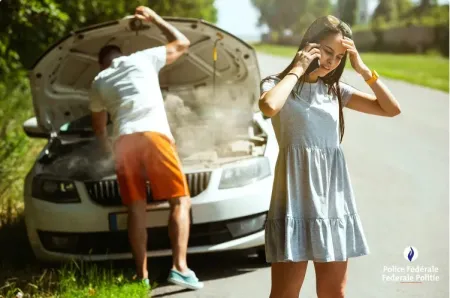Driving in the heat: beware of the dangers
As you may have noticed, the high temperatures are there. And on the road, they unfortunately create more risks. Here are some tips.

Many of us are delighted with the sunny days that have set in. However, while mild weather puts you in a good mood, high temperatures lead to a drop in concentration. Not to mention the decrease in the quality of sleep. And who says sleep debt, says risk of accidents. "Sleeping on average less than 6 hours increases the risk of accidents by 3 to 6 times," says the Walloon Agency for Road Safety (AWSR).
In its latest survey, VIAS looked back at several statistics. "In heatwaves, the average number of accidents with fatalities or injuries is on average 7% higher than when the weather is 'normal'. The number of serious accidents increased even more sharply: +11%. This is due in particular to the greater presence of two-wheelers on the roads. As for the number of killed and seriously injured, it increased by 14%. There are also more people on the roads. »
Not to mention that cyclists and motorcyclists sometimes leave behind certain equipment. "For motorcyclists, the rule does not change, you have to cover up everywhere, summer and winter. There is summer equipment that protects while being very ventilated. And on a bike, even if wearing a helmet is not mandatory, it is still a useful tool for falls and here too, some models of helmets are more adapted to the heat," says Commissioner Olivier Quisquater.
While there is nothing we can do about the heat, it is possible to adjust your behaviour.
Some tips for the heat
- Stay hydrated: Drink water regularly, even if you're not thirsty. And avoid sugary or caffeinated beverages, which tend to dehydrate. If you don't have air conditioning, opt for cross-ventilation. "You can, for example, open the driver's window and the right rear passenger window," says Olivier Quisquater.
- Plan your trips: avoid hitting the road during the hottest hours, usually between 12 p.m. and 4 p.m.
- Take breaks: If you're riding for a long time, don't forget about breaks. Stretching your legs will help you leave more focused.
- Drive slowly: limit sudden acceleration and braking. This will prevent the engine from overheating.
- Protect yourself and your vehicle: opt for a sun visor (especially in the back for children) or a towel to protect your car and dashboard. If you have to park, choose the shade. Think about yourself too: choose light clothes and put on sunscreen.
- Don't leave anyone in your vehicle parked: whether it's a pet or a person, never leave them inside the car, even for a short time and with the windows ajar.
Dangers also for your vehicle
The heat wave is also a source of danger for your vehicle. "In the event of high heat, breakdown services record 20% more calls. The most common problems are related to the batteries and the engine cooling system," VIAS says.
The AWSR insists on a few driving instructions. "Don't turn on the air conditioning as soon as you start your vehicle to prevent the system from drawing too much energy from the battery. Instead, open all the windows for the first few miles. »
Also avoid too large temperature differences between the interior and exterior of the vehicle. "Maintain an interior temperature that does not exceed 4 to 7 degrees difference from the outside so that you don't have too much of a temperature difference, which considerably increases the consumption of your vehicle. »
Don't forget the usual checks: the level of the tyres (under-inflated, they are more sensitive to the risk of explosion), coolants, brakes, engine oil,... Also take a look at the engine temperature gauge on your dashboard. "With the heat, your engine may not cool properly. If the gauge is in the red, stop in a safe place, turn off the ignition and wait until it drops to 90°. »
It's also high time to change your winter tyres! "It's imperative now: not only will they wear out faster, but the braking distance will be extended. Not to mention that the tarmac can melt under the high heat and become slippery! Commissioner Quisquater concludes.